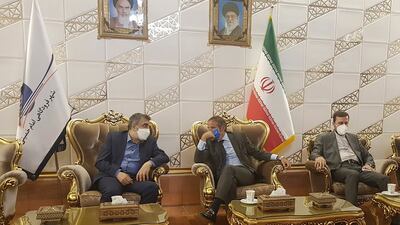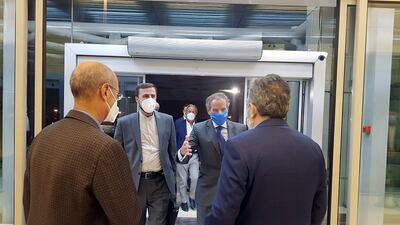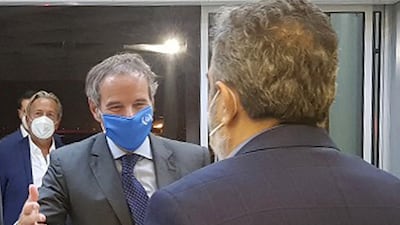Iran has said talks with the UN's nuclear watchdog were “constructive” and a deal has been struck to avoid a diplomatic shutdown this week.
The country has agreed to let the International Atomic Energy Agency replace memory cards in surveillance cameras used to monitor work at nuclear sites. The recordings will be sealed and stored in Iran.
Iran is now enriching small amounts of uranium to its closest-ever levels to weapons-grade purity as its stockpile continues to grow. But talks will continue with world powers to prevent Tehran from creating a bomb.
“Inspectors are permitted to service the identified equipment and replace their storage media which will be kept under the joint IAEA and AEOI [Atomic Energy Organisation of Iran] seals in … Iran,” a joint IAEA-Iranian statement said.
Rafael Grossi, head of the UN's nuclear watchdog, said: “I am glad to say that today we were able to have a very constructive result, which has to do with the continuity of the operation of the agency’s equipment here."
He said it was "indispensable for us to provide the necessary guarantee and information to the IAEA and to the world that everything is in order”.
"“We had a major, major communication breakdown with Iran, which, of course, is something we cannot afford, having so many important issues that we need to solve,” Grossi told reporters on his return from Tehran.
“And I think that was solved.”
A joint statement released by the IAEA and Iran confirmed the understanding, saying only that “the way and the timing are agreed by the two sides.”
Mr Grossi said the agreement would ensure “continuity of knowledge” that would ensure the watchdog can piece together the data it needs in future.
“The reconstruction and the coming together of the jigsaw puzzle will come when there is an agreement at the JCPOA level,” he said, a reference to the talks on reviving the 2015 deal between Iran and world powers. “But at that time, we will have all this information and there will not have been a gap.”
The announcement could buy time for Iran ahead of an IAEA board meeting this week in which Western powers had been arguing for Tehran to be censured over its lack of cooperation with international inspectors. Eslami said Iran would take part in that meeting and its negotiations with the IAEA would continue there.
The head of the AEOI, Mohammad Eslami, described the negotiations between Iran and the Vienna-based IAEA as “sheerly technical” without any room for politics. He said Mr Grossi would return to Iran soon to talk to officials, without elaborating. Also left unsaid was whether Iran would hand over copies of the older recordings, which Tehran had previously threatened to destroy.
The joint statement on the "constructive" talks said of replacing the memory cards: “The way and the timing are agreed by the two sides.”
Mr Grossi was seeking to ease tensions between Iran and the West that have threatened to destroy talks to remove US sanctions in exchange for Iran's compliance with a 2015 nuclear deal signed with world powers.
The IAEA told member states in its confidential quarterly report last week that its verification and monitoring activities have been “seriously undermined” since February by Iran’s refusal to let inspectors access their monitoring equipment.
Since then, Iran's cooperation with international inspectors has been intermittent.
The IAEA said certain monitoring and surveillance equipment cannot be left for more than three months without being serviced. It was provided with access this month to four surveillance cameras installed at one site, but one of the cameras had been destroyed and a second had been severely damaged, the agency said.
Iran's new hardline president, Ebrahim Raisi, has insisted that his country is being “transparent".
The IAEA informed member states that there had been no progress on two key issues: explaining uranium traces found at several old, undeclared sites and obtaining urgent access to monitoring equipment so that the agency can continue to keep track of parts of Iran's nuclear programme.
Earlier this month, the IAEA said that Iran has continued to increase its stockpile of highly enriched uranium.
Separate, indirect talks between the US and Iran on both returning to compliance with the 2015 deal have been suspended since June.
Negotiated by former US President Barack Obama, the deal limits Iran's nuclear capabilities in exchange for sanctions relief but did not encompass Iran's ballistic missiles programme — seen as a threat by regional nations such as Israel.
In 2018, under the Trump administration, the US withdrew from the deal, reintroducing painful economic sanctions.
Washington and its European allies have urged Mr Raisi's administration, which took office in August, to return to the talks.
Iran responded to Mr Trump's withdrawal in 2019 by breaching many of the deal's core restrictions, such as enriching uranium to a higher purity than the agreed 3.67 per cent, closer to that suitable for use in nuclear weapons.
At Monday's meeting of the UN agency's 35-nation board of governors, Western powers must decide whether to push for a resolution criticising Iran and raising pressure on it for stonewalling the IAEA.
From Riyadh, the top diplomats of Saudi Arabia and Austria jointly expressed concern over Iran’s nuclear advances, with Austrian Foreign Minister Alexander Schallenberg citing “Iran’s failure to allow access for nuclear inspections”.
Israeli Prime Minister Naftali Bennett urged world powers to not “fall into the trap of Iranian deception that will lead to additional concessions” over the impasse.
A resolution could jeopardise the resumption of talks on the deal, as Tehran bristles at such moves.
Countries on the IAEA board of governors were watching Mr Grossi's visit to see whether Iran would grant access to the monitoring equipment, or offer prospect of answers on the uranium particles found at the undeclared former sites.



